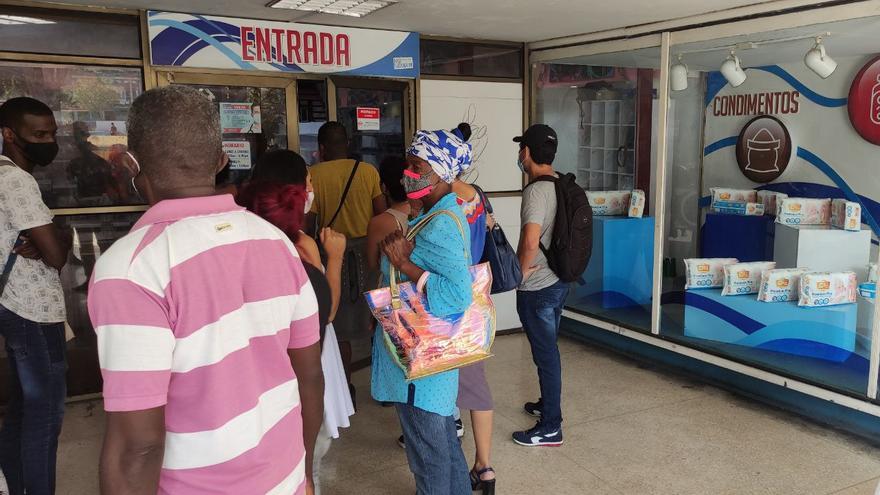
![]() 14ymedio, Madrid, 15 April 2022 — Due to the lack of fuel, almost all of the disposable diapers produced in Cuba are distributed in Havana with a small percentage distributed in neighboring provinces. The data is revealed by the director of retail sales of the government corporation Cimex in a Cubadebate article dedicated to the scarcity of this basic product.
14ymedio, Madrid, 15 April 2022 — Due to the lack of fuel, almost all of the disposable diapers produced in Cuba are distributed in Havana with a small percentage distributed in neighboring provinces. The data is revealed by the director of retail sales of the government corporation Cimex in a Cubadebate article dedicated to the scarcity of this basic product.
The article notes that disposable diapers began to be produced in Cuba in 2019 through a Vietnamese company whose factory is located in the Mariel Special Development Zone. The plant planned to produce 120 million diapers a year, but parents still can’t find them and “when they appear they run out in half an hour or the resellers buy them,” denounces a mother who points out that, on the other hand, they are never “missing in MLC” [government stores that only accept freely convertible currency].
Last February, 14ymedio said that you had to prove you have a child to buy diapers in stores that take payment in national currency, which caused disputes between customers who had approached the store without carrying the required ID card and the employees who demanded it.
The Thai Binh Global Investment Corporation pledged that same month to continue producing diapers, wipes and pads and sell them in local currency. On its Facebook page, the stores where they are going to be marketed and the available sizes are reported every week, but many doubt that the information is true, since when they go they do not find what is advertised.
Yusleydi Lezcano Palmero, director of retail sales at Cimex, assures that the situation has improved, since in the first quarter of the year there were 94.3% more diapers than in the same period of the previous year and that the chain has even reduced imports to “strengthen the Mariel supplier.” However, the problem, according to the official, is that there is an “over-demand,” a concept that Cubadebate is forced to translate at the end of the text.
“In economics, over-demand is understood as the situation in which the quantity demanded (demand) of a product or service exceeds the quantity offered (supply). This is the opposite of excess supply,” says the official newspaper in a didactic display, which has copied the wikipedia explanation of the term “excess demand,” but omitting the first definition that appears: shortage.
Lezcano Palmero says that this April the plan was for 91,297 packages, of which 85,442 have been delivered. All were sold in less than 72 hours, explains the official, who notes the control with a card required for sale. This reflects how, despite the increase in production, the shortage is notable.
Lezcano Palmero points out that the difficulties in acquiring raw material “due to the crisis caused by the pandemic” have had an influence, but he disassociates himself from the matter and blames the Vietnamese manufacturing company.
“Cimex does not intervene. It is a direct delivery to the store. The diapers do not go through any warehouse, taking into account the needs of Cuban families,” he says. The official admits that there have also been problems with distribution, also the fault of Thai Binh, which distributes, according to the contract.
“Sometimes we have had roadblocks, because due to an internal logistical issue of the Vietnamese company, the diapers arrive minutes or hours late or do not arrive on the agreed day,” he justifies. But when asked why there are places they never appear, he admits the privilege of the capital.
“The priority has been 94.5% Havana, and then the rest of the nearby provinces, which has to do with the logistics issue due to the fuel situation, which today affects everyone,” he acknowledges.
Isla de la Juventud, according to what he says, has a “differentiated” treatment, but they have not received diapers lately either because of “the weather situation.”
The first disposable diapers that were sold in Cuba arrived with the economic opening of the 90s and the dollarization of the economy. Until then there were only cloth ones, which were washed after each use. But the sale was only in dollars or convertible pesos, which turned them into a product that segregates those who could not afford them and those who received remittances from relatives abroad or had income in foreign currency.
The Vietnamese company, which had been in Cuba for decades, announced in 2018 the construction of a plant to produce diapers and its purpose of “providing local consumers with articles made in Cuba and of high quality.”
But three years after the start of its operations, a step back has been taken and disposables have once again become the dividing line between those who can have foreign currency and those who do not.
____________
COLLABORATE WITH OUR WORK: The 14ymedio team is committed to practicing serious journalism that reflects Cuba’s reality in all its depth. Thank you for joining us on this long journey. We invite you to continue supporting us by becoming a member of 14ymedio now. Together we can continue transforming journalism in Cuba.
